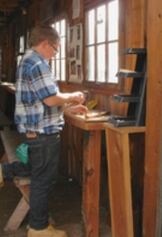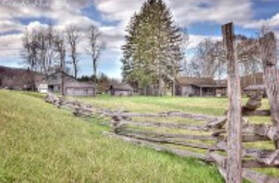School Tours
What to Expect

What was life like for a family living on a farm in the early 1800ʼs in upstate New York? That question is answered when school children visit the Farmstead. In May, June, and September costumed volunteers welcome hundreds of school children in grades 2-6, as well as home-schooled children and Scout groups. A hands-on experience is provided for all during the 2.5 hours at the Farmstead.
Agriculture has played an essential role in the formation of this community. At the Bement-Billings Farmstead students explore their connection to the farm through interactive communications with trained museum guides, the study of 19th century artifacts, and five selected hands-on activities. The children are given a brief history of the Bement family before their adventure begins.
Their activities may include: churning butter in a real pre-Civil War kitchen while our cook presents information about cooking on an open hearth; learning lessons in a one-room school; carding and spinning wool into yarn; visiting a woodworking shop where they learn about historic tools and they make a tin punch ornament; learning about the uses of herbs and wild foods; designing a quilt square; and watching a blacksmith work at the forge. Our program satisfies the New York State Learning Standards for Social Studies I, 2, 3, 4, 5; English/Language Arts 1, 4.
The visit can be finished with a picnic lunch and a chance to play with old-time toys. If you have the time, or want to come back to the Farmstead with your family, you can take a leisurely walk across the bridge and enjoy our 1.5 miles of Sycamore Bridge Nature Trails. For more information about the tours, or to join our volunteer staff, call (607) 642-9516. Training will be provided.
Agriculture has played an essential role in the formation of this community. At the Bement-Billings Farmstead students explore their connection to the farm through interactive communications with trained museum guides, the study of 19th century artifacts, and five selected hands-on activities. The children are given a brief history of the Bement family before their adventure begins.
Their activities may include: churning butter in a real pre-Civil War kitchen while our cook presents information about cooking on an open hearth; learning lessons in a one-room school; carding and spinning wool into yarn; visiting a woodworking shop where they learn about historic tools and they make a tin punch ornament; learning about the uses of herbs and wild foods; designing a quilt square; and watching a blacksmith work at the forge. Our program satisfies the New York State Learning Standards for Social Studies I, 2, 3, 4, 5; English/Language Arts 1, 4.
The visit can be finished with a picnic lunch and a chance to play with old-time toys. If you have the time, or want to come back to the Farmstead with your family, you can take a leisurely walk across the bridge and enjoy our 1.5 miles of Sycamore Bridge Nature Trails. For more information about the tours, or to join our volunteer staff, call (607) 642-9516. Training will be provided.
Making the Most of Your Visit

- Students should be dressed for outdoor activities, including warm, waterproof footwear.
- You may wish to bring moist towelettes for hand washing, a simple first-aid kit, and a cell phone. If any students require prescription medications, these need to be carried in their original containers.
- Students should be assigned to smaller groups of 10-15 before they arrive at the Farmstead. Color-coded name tags or stickers are useful for identifying groups.
- We suggest that one adult chaperon accompany each group of students.
- If a scheduled lunch period will be part of the field trip experience, students should bring labeled “brown bag” lunches which include beverages. (Include a few lunches to spare for those who forget.) We appreciate efforts to carry out trash.
- Students are welcome to photograph their day at the farmstead.
- Chewing gum and candy are not allowed inside any of our historic structures.
Suggested Field Trip Follow-up Activities
(appropriate for all grades)
(appropriate for all grades)
Create a class scrapbook of your field trip. Each student can prepare one page which may include a poem, short story, or essay. Photographs, drawings, and captions will enhance the project. Encourage your students to use imagination and creativity.
The cost of our program is $5.00 per student. We prefer payment in the form of a check presented on the day of the tour. Checks should be made payable to Newark Valley Historical Society. Teachers scheduling through the BOCES program may use the procedures set forth in the BOCES brochure.